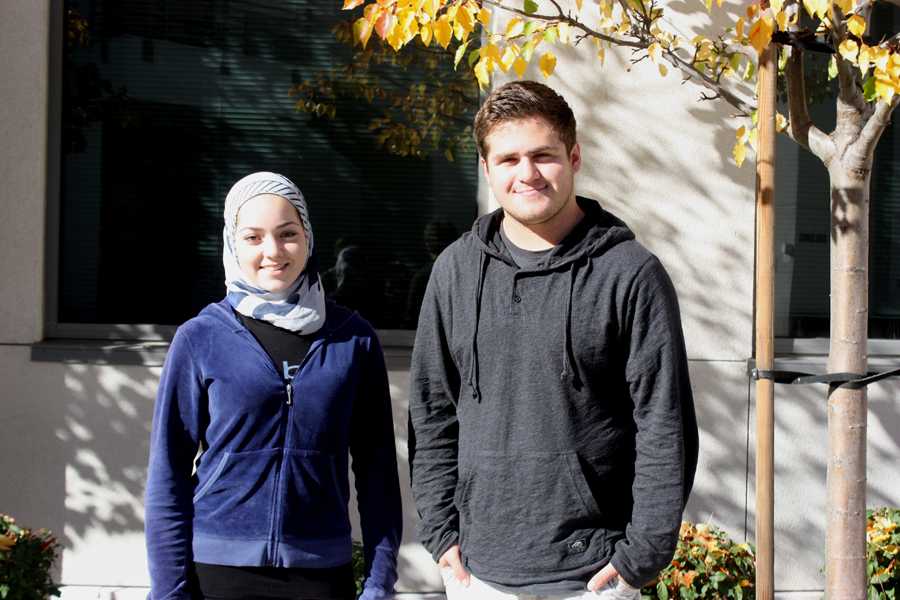Many multicultural students walk out of one culture and into another everyday.
Those whose parents that have immigrated from foreign countries tend to have bigger dreams after high school.
“They [my parents] always make us strive for the best to go to a good school after high school,” said senior Jon Akkawi, whose parents are from Jordan.
Some families even utilize breaks from school as ways to improve children’s academics.
“Americans see summer as a time to relax while Asian parents believe it’s time to work even harder because you’re not in school,” said senior Celina Lee, who moved to the United States from Taiwan at age eight. “It’s time to perfect skills or learn new things.”
Others aren’t allowed to hang out during school days.
“I must stay home to study,” said junior Rosemarie Majdalani, whose family is from Lebanon, “but I’m allowed to go out on the weekends.”
Most students only learn a second language for the two years required to graduate. Students who have parents that moved from a foreign country use various languages daily.
“I now can speak, read and write in three languages fluently,” said senior Cara Zhou, who moved from China last year. “My multicultural background also gives me the ability to look at issues in a broader view.”
However it can be difficult to balance between different languages.
“If I speak in English [at home], my mom gets angry at not speaking in our mother tongue,” said sophomore Abhi Ilindra, whose family is from India.
Other than the academic aspect of high school, a big part of the American high school experience revolves around making friends, starting relationships, and having fun. Multicultural students also make use of high school’s socializing opportunities, but with a twist of their cultures mixed in.
Unlike most American students in high school who start dating early, students of different cultural backgrounds have certain limitations when it comes to dating.
“Cambodians don’t believe in dating until college,” said sophmore Kara Guse, who is half Cambodian. “After high school, you are allowed to date.”
Other students have different views on dating.
“The dating thing is complicated,” said Ilindra. “My mom gets upset when I say I don’t like anyone, but she says I’m not allowed to date.”
Sarcasm and jokes are very common among Cal High students’ daily interactions and conversations. Some cultures take offense to this humor.
If Guse sarcastically comments about a girl’s outfit, her mother asks her to be respectful.
“We (Cambodians) have to be respectful to all of the other people,” said Guse, “We don’t like [a] sense of humor that puts down other people, and we don’t like racist jokes.”
While American students have complete liberty to wear what they want to school, some multicultural students may not enjoy this freedom.
“They usually like if I’m dressed nicely not like jeans with holes. Girls are different. Most Arab parents always make them wear longer clothing showing modesty,” said Akkawi
These students are influenced by other cultures not only at school, but at home.
“I pray every morning, and follow all the procedures,” said Illindra, who believes in Hinduism. “I chant basic prayers like ‘I welcome you to home,’ ‘I offer you a seat for water and food’ for worshipping god.”
Some also pray before leaving the house.
“Before we leave, we ask for blessings,” said Guse, who is Christian. “We have a big prayer circle.”
Diverse cultural backgrounds also affect students’ values.
“Family is something that Arabs value greatly,” said Akkawi, “(It’s) not just mom and dad and siblings but also aunts and uncles and the rest of the extended family which is one reason why I always go back home to the middle east every summer.”
Students who have lived in foreign countries find the American culture vastly different from the one in which they grew up. Some students who were raised in big cities find it harder to visualize life in the suburbs.
“I lived in a big apartment complex in a place that’s closer to the city than San Ramon is, and you didn’t need a car to get anywhere,” said senior Emilie Forester, who moved from Japan at age five. “You can have a bike and for around five bucks, you can get to a large shopping center from the train.”
Freshman Viktor Zhidkov moved from Russia two years ago. He arrived in America with only a basic knowledge of English from his teachers in Russia.
“I had to learn how to speak fluently by the second half of eighth grade,” said Zhidkov.
“I learned English in two-and-a-half years.”
The multicultural trend not only affects students, but teachers as well.
Teachers such as English teacher Eghosa Obaiza, whose parents are from Nigeria, find her culture beneficial to her classroom environment.
Growing up in a Nigerian family, Obaiza learned to appreciate the Nigerian values that place education as a high priority. Because of this, she understands the differences that students may face in their teenage years.
“In terms of students, everyone is different,” said Obaiza, “I try to give a comfortable environment for my students, so they can find their own place.”
She also thinks that her culture forces her to look at the world not in a singular way, but allows her to balance the positive and the negative.
Math teacher Jatinger Singh, who moved from India when he was 45, also agrees that his culture influences the way he teaches.
“My level of expectation of students is higher,” said Singh. “I don’t expect to turn down or dilute those expectations. In the long term, it is good for the students and the country, too.”
Many American students appreciate the diversity that multiculturalism adds to the American way of life.
“I have a lot of friends who come from different backgrounds that I have met either at school or through sports,” said senior Kali Conlon.
“I really respect how they take on American culture. I think it’s cool how they put together aspects of their culture and put an American twist on it.”
Some find their experiences make them more open to new cultures, and aspire them to become “worldly” people.
“I’m a citizen of the world; I don’t just belong to one society,” said Lee. “ I can now step into both worlds and enjoy their beauty.”





